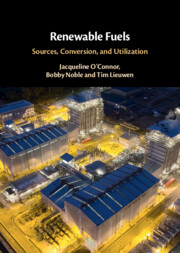Book contents
- Frontmatter
- Contents
- Contributors
- Preface
- Part I Users and Conversion Devices
- 1 Aero Gas Turbines
- 2 Ground-Based Gas Turbines
- 3 Reciprocating Engines
- 4 Process Heaters
- 5 Fuel Cells and Hydrogen Production
- Part II Chemical Energy Carriers
- 6 Syngas and Biogas
- 7 Liquid Fuel Synthesis
- 8 Ammonia
- 9 Metal Fuels
- 10 Bio-based Solid Fuels
- Part III Fundamental Combustion Processes
- 11 Fundamentals of Gaseous Combustion
- 12 Liquid Fuel Atomization and Combustion
- 13 Pollutant Emissions of Alternative Fuels
- Part IV Case Studies
- 14 Certification of Drop-In Alternative Fuels for Aviation
- 15 Fuel Composition Influences on Reciprocating Engine Performance
- 16 Near-Zero- and Zero-Carbon Fuels in Industrial Gas Turbines
- 17 Hydrogen Solutions for Net-Zero Power Generation
- Index
7 - Liquid Fuel Synthesis
from Part II - Chemical Energy Carriers
Published online by Cambridge University Press: 01 December 2022
- Frontmatter
- Contents
- Contributors
- Preface
- Part I Users and Conversion Devices
- 1 Aero Gas Turbines
- 2 Ground-Based Gas Turbines
- 3 Reciprocating Engines
- 4 Process Heaters
- 5 Fuel Cells and Hydrogen Production
- Part II Chemical Energy Carriers
- 6 Syngas and Biogas
- 7 Liquid Fuel Synthesis
- 8 Ammonia
- 9 Metal Fuels
- 10 Bio-based Solid Fuels
- Part III Fundamental Combustion Processes
- 11 Fundamentals of Gaseous Combustion
- 12 Liquid Fuel Atomization and Combustion
- 13 Pollutant Emissions of Alternative Fuels
- Part IV Case Studies
- 14 Certification of Drop-In Alternative Fuels for Aviation
- 15 Fuel Composition Influences on Reciprocating Engine Performance
- 16 Near-Zero- and Zero-Carbon Fuels in Industrial Gas Turbines
- 17 Hydrogen Solutions for Net-Zero Power Generation
- Index
Summary
Liquid hydrocarbon fuels are an essential component of our energy system. They have unprecedented volumetric density of energy, roughly 32 MJ/liter for gasoline, compared to a lithium ion battery at 2.4 MJ/liter. This means that for activities requiring high or sustained power delivery such as flying and shipping there are no current alternatives. Compared to electric motors, internal combustion engines have significantly lower efficiency, and the recent improvements in the electric vehicle sector suggest that at least for light vehicle duty their use is not essential. However, despite significant government action to promote electrification of the light duty fleet, there will still be a period of transition that could last well over a decade as the developing world increases its consumption of transportation services and the world builds the capacity to electrify personal transportation. Therefore, there is an urgent need to develop pathways to produce renewable liquid hydrocarbon fuels as part of the energy transition to low carbon energy systems.
- Type
- Chapter
- Information
- Renewable FuelsSources, Conversion, and Utilization, pp. 216 - 244Publisher: Cambridge University PressPrint publication year: 2022



